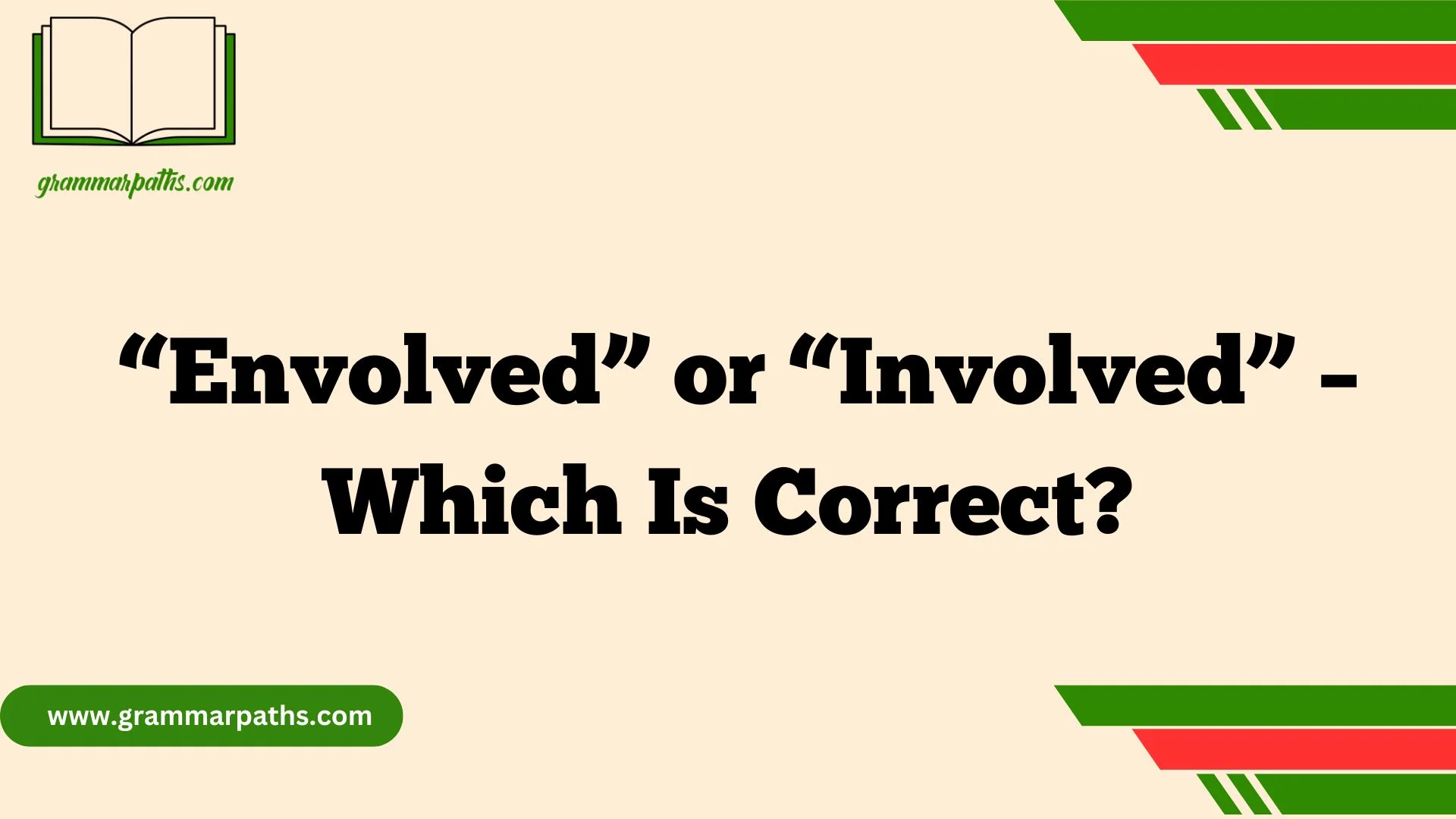If you’re learning English, you’ve likely come across the confusing pair “involved” or “envolved.” But here’s the truth: “envolved” is not a valid word in any reputable English dictionary. It’s a common spelling mistake that arises from how the word sounds in spoken conversations. The correct word is “involved,” and it’s widely used in writing, speaking, and daily communication. Whether you’re talking about being engaged in an activity, part of something, or connected to a project, “involved” is the proper term to use.
Many English learners confuse “involved” and “envolved” due to similar sounding words and vocabulary mix-ups. This is especially common when switching between informal and formal language, or between spoken vs. written English.
Understanding the difference and learning the correct spelling boosts your communication skills, strengthens your grammar, and improves your overall writing. As part of improving your language skills, it’s important to focus on proper word choice, avoid misused words, and follow grammar tips that clarify these tricky terms.
So, if you’re aiming for writing improvement and more confident language usage, remember: “involved” is the word you want — “envolved” doesn’t belong in the English vocabulary.
The Straight Answer: What’s the Deal with “Envolved”?
- “Involved” is a valid, widely used word with several meanings.
- “Envolved” is not recognized in standard English—no entries in major dictionaries like Merriam-Webster or Oxford.
- Spellcheckers often flag “envolved” as incorrect and suggest “involved” instead.
In short, “involved” is correct. “Envolved” is a misspelling born from phonetic guesswork or confusion with “evolved.”
Understanding “Involved” – Definition & Usage
“Involved” scores high in versatility. It can be a verb or an adjective, and its uses range from everyday situations to emotional contexts and formal writing. Let’s unpack those layers.
Definitions
- Verb (past tense of involve)
- To include or make part of something.
- To include or make part of something.
- Adjective (descriptive form)
- Engaged in something mentally or emotionally.
- Complex or intricate.
- Engaged in something mentally or emotionally.
Real-World Examples
- Participation: She was involved in organizing the festival.
- Emotion: He became deeply involved in the community.
- Complex situations: The contract is quite involved and needs careful review.
Each sentence clearly showcases a different shade of involvement: activity, feeling, and complexity.
Why “Envolved” Isn’t a Word—But a Common Mistake
Ever notice how often “envolved” pops up in casual writing? That’s usually because:
- Phonetic guess: The “e” prefix in words like “enclose,” “embrace,” or “enroll” might mislead people into saying “envolved.”
- Visual slip-up: The similar look of “envolved” and “involved” can trick your eye.
- Crossing with other words: Words like “evolved” or “enveloped” may sneak into your typing brain and swap in wrongly.
- Autocorrect adoption: Some keyboards or apps suggest “envolved” if you type rapidly and leave space for errors.
But a quick check in any major dictionary confirms: “envolved” has no legitimate standing.
Is There Any Real-Life Use of “Envolved”?
You might stumble on “envolved” in archaic or regional texts, but it’s rare and outdated:
- Archaic texts: Some old legal or philosophical works may have used “envolve” centuries ago—but these are not part of modern English.
- Misread translations: Non-native speakers translating from languages where similar roots exist might mistakenly coin “envolved.”
- Unofficial creative writing: Blog posts, fan fiction, or informal writing—where spelling checks aren’t enforced—may contain “envolved,” but it remains grammatically incorrect.
Bottom line: don’t rely on such stray uses when writing formally or for a broader audience.
Quick Comparison: “Involved” vs. “Envolved”
| Feature | Involved | Envolved |
| Dictionary Presence | ✅ Present in all major ones | ❌ Absent |
| Part of Speech | Verb / Adjective | N/A (misspelled form) |
| Common Usage | Everyday and formal writing | Occasional error |
| Confusion Sources | N/A | Evolved, Enveloped |
| Pro Tip | Use confidently | Avoid entirely |
This table helps you visually lock in the difference—and permanently ditch “envolved” from your writing toolkit.
How to Remember: Never Use “Envolved”
Here’s some easy-to-apply memory magic:
- Mnemonic phrase:
- Involve starts with I—so think: I participate.
- Involve starts with I—so think: I participate.
- Sibling word check:
- Think: “I’m involved in today’s task, not ‘envolved.’”
- Think: “I’m involved in today’s task, not ‘envolved.’”
- Prefix awareness:
- “In-” and “en-” suites sound alike, but only “involved” is spelled with “in.”
- “In-” and “en-” suites sound alike, but only “involved” is spelled with “in.”
Try these tricks when you’re writing. It might seem trivial, but these sticky tidbits help boost accuracy over time.
Common Usage Examples to Anchor Meaning
- Maria gets involved in charity work every summer.
- Avoid involved sentence structures when writing blog posts—they confuse readers.
- When you’re emotionally involved, objectivity can slip.
- The plot gets involved as more characters step in.
- Daniel’s role in the project keeps him deeply involved.
These sentences reflect everyday use—formal, emotional, structural, narrative, and participatory contexts.
The Psychology of Confusion: Why You Mistype “Envolved”
Let’s break down the layers of mix-up:
- Visual similarity: “Envolved” and “involved” look alike at a glance, which easily tricks fast readers.
- Autocorrect temptation: If “envelope” is common in your typing, your device may automatically propose “envolved” instead of “involved.”
- Mental cross-wiring: Words like “evolved,” “enveloped,” and “involved” share prefixes and suffixes, blurring lines.
- Informal adoption: Bloggers or influencers using “envolved” may inadvertently reinforce its misuse if they don’t double-check.
Being aware of these pitfalls helps you stop the error before it sneaks into your copy.
The Role of Grammar Tools: Grammarly & AI Checks
Your go-to writing assistant probably flags “envolved” right away:
- Grammarly offers suggestions such as “Did you mean ‘involved’?”
- Microsoft Word/Google Docs highlight it in red, with the same replacement suggestion.
- AI editors (like Jasper, Copysmith) often auto-replace “envolved” with “involved” or “evolved,” depending on the context.
These tools don’t just correct—they also help you learn. Repeated exposure builds muscle memory around the correct spelling.
Interactive Quiz: Practice Using “Involved” Correctly
Test your instincts—and catch those mental traps—in seconds.
Choose the correct word:
- She became deeply ___ in the project.
- The storyline grew more ___ with each chapter.
- Have you ever ___ yourself in charity events?
- His role was ___ and needed deep focus.
- She’s ____(evolving / involving) herself in new hobbies.
Answers:
- involved
- involved
- involved
- involved
- No correct variant—it needs “involving.”
Use this quiz in your writing workshops, classroom, or solo practice. It keeps the right word front-and-center.
FAQs:
What is the difference between involve and envolve?
“Involve” is a standard English verb meaning to include or engage. “Envolve” is not recognized in modern English dictionaries—if you see it, it’s almost always a misspelling of “involve” or a confusion with “evolve.”
Is it correct to say “get involved”?
Yes—“get involved” is an idiomatic phrase meaning to begin participating or to become engaged in an activity, cause, or situation. For example, “She decided to get involved in the community clean-up project.”
What does “envolved” mean?
“Envolved” is not a standard English form. Writers sometimes use it by mistake when they mean “involved.” If you come across “envolved,” it’s best to change it to “involved” (past participle of involve).
What is meant by “involved”?
“Involved” can function as:
- The past participle of involve (“She was involved in the meeting”).
- An adjective meaning complex or complicated (“This is an involved process with many steps”).
What is an example of involve?
He wanted to involve all team members in the decision-making, so he scheduled a brainstorming session.
What is the difference between evolved and involved?
- Evolved is the past tense of evolve, meaning to develop gradually over time (“Species evolved new traits”).
- Involved is the past participle of involve, meaning to include or engage (“He was involved in planning the event”).
Conclusion
In summary, “Involved” is the correct and accepted word in the English language, used to describe someone taking part in an activity or being connected to a situation. The term “Envolved” is not recognized in standard English and is most likely a common misspelling or a typo.
Whether you’re writing an email, an academic paper, or a casual message, using the correct form of involved will ensure clarity and professionalism. Always double-check your spelling to avoid confusion and strengthen your English grammar skills. Remember, when in doubt, stick with “involved”—it’s the right choice every time.

Emma Brooke is a passionate language expert and contributor at GrammarPaths.com, where she helps learners navigate the complexities of English grammar, idioms, and effective writing. With a strong academic background and years of teaching experience, Emma excels at turning tricky grammar rules into simple, practical lessons that readers can easily grasp.












